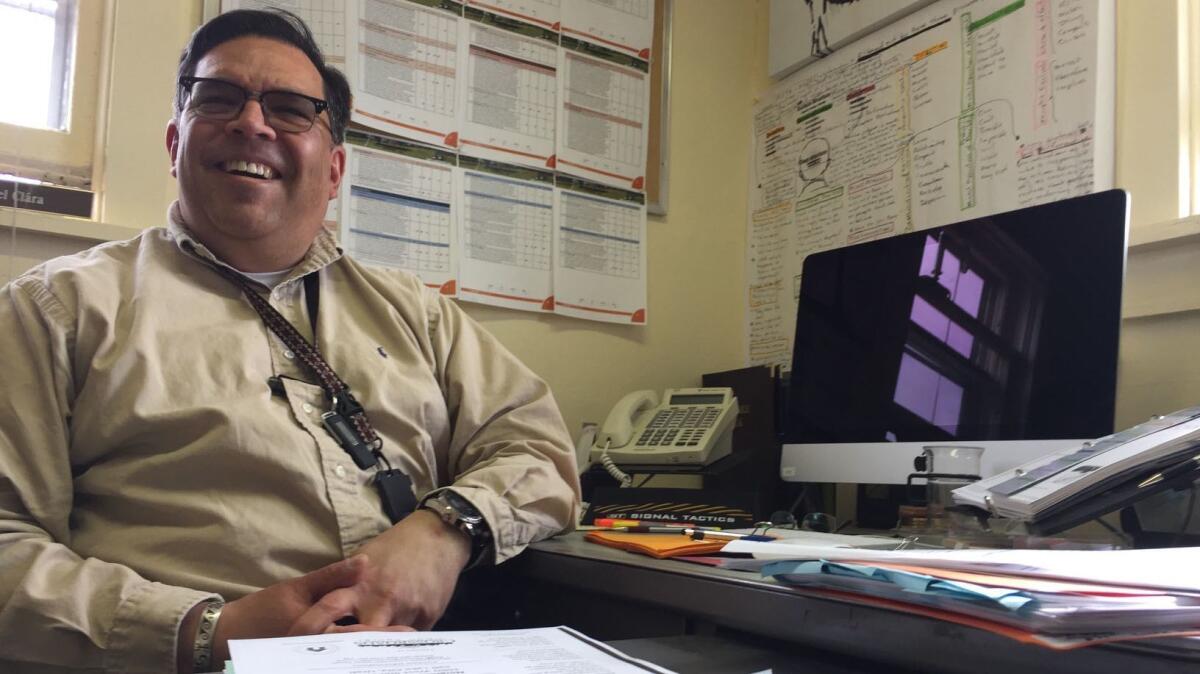Fearful parents sign papers for friends to care for kids in case they’re deported

- Share via
Reporting from Salt Lake City — She saw the news of the raids happening around the country and felt helpless. Scared. She had lived here for more than a decade, following her father’s advice: Work hard and stay out of trouble.
But suddenly it felt as though trouble was looking for her. Lorena Napola worried about her four children. What if she were hauled away? Who would make sure they got to school? To doctors’ appointments? To church?
The questions weighed on her in recent weeks. She saw on the news a mother in Arizona get picked up by federal agents for deportation. Napola thought the woman seemed normal. Unassuming. She was without papers. Like her.
Napola’s friends spoke of rumors: Dark trucks filled with people in dark uniforms raiding nearby neighborhoods. She knew President Trump campaigned to crack down on illegal immigration and now he appeared to be a man of his word.
So she went to see Andres Paredes, a leader at her local Mormon church. Three of her children are U.S. citizens, she told him. Would he care for them if la migra came and she were deported?
Paredes, a quiet man who came to the United States from Peru decades ago, drew up power of attorney papers that gave him authority to make school, medical and other decisions for her children in case she and her husband were deported. Napola felt relief that her kids would be cared for and sadness that it had come to this.
“They are my life,” she said. “They are everything.”
As the papers were signed, Paredes said, his heart broke. He has signed power of attorney with two families.
“It’s a big responsibility,” he said softly. “I’m not sure it’s entirely sunk in yet.”
The fear among immigrants in the United States illegally has reached such a pitch that some have altered their lifestyles, won’t answer the door if someone knocks and pay close attention to reports of U.S. Immigration and Customs Enforcement actions on social media and the news.
But Larry Love, who leads a Mormon stake in Salt Lake City, said many like Napola are going a step further: finding trusted people to sign power of attorney papers to ensure their U.S.-born children could continue to thrive in the country if they’re deported.
Love said in his church of fewer than 200, more than 20 people have signed power of attorney papers with friends or clergy since Trump was inaugurated. He signed one with Norma Flores, who wanted to do it last year because she thought Trump would win and his rhetoric frightened her. He said more have been requested by people in the church.
Flores, who has been in the United States for 13 years, always lived with the threat of deportation, but it wasn’t until Trump won in November that the 38-year-old felt like deportation could be a real possibility.
After they signed power of attorney papers with Love to care for her 10-year-old son, she and her husband purchased a plot of land in Mexico. Just in case. But she hopes she never lays eyes on it.
She said she would be sad to be separated from her son, who is in the fourth grade and dreams of being a soccer player. But she laughed while sitting in the booth of a small restaurant one recent morning with Love and added that her son also was good at math.
“I want a better education for my son,” she said. “I want my son to live in a place that is free and with opportunity.”
She is worried more about her other son, who is 14 and came with her and her husband when he was just a year old. Flores fears that if he had to go back to Mexico, he would be bullied because he grew up in America. She also fears being a victim of crime in Mexico because in the small town where she bought land, Flores said, people will assume they have money.
“I am scared,” Flores said. “But I trust in God that he has a plan for me, and I will accept that.”
From wiretap accusations to travel ban 2.0, here’s what Trump did this week »
Power of attorney paperwork is becoming a part of workshops being put on by civil rights and immigrant rights groups and churches throughout the country in light of Trump’s executive order which expanded ICE’s criteria for arresting and deporting immigrants in the country illegally.
“The president wanted to take the shackles off individuals in these agencies,” White House Press Secretary Sean Spicer said last month.
Mayra Joachin, a staff attorney with the National Immigration Law Center, said recent high-profile arrests have sparked a push for preparation — including power of attorney paperwork.
She said the arrest of Romulo Avelica-Gonzalez, a 48-year-old father of four, after he dropped off his daughter at a school in Los Angeles, was particularly jarring, as was the arrest of Daniela Vargas in Mississippi after she left a news conference in which she had called for immigration reform.
Avelica-Gonzalez had been in the country 25 years and has four children — all born in the United States.
Joachin said having immigrants with U.S.-born children sign power of attorney papers gained steam in 2010 when Arizona passed an anti-illegal immigration bill that became a template for other state legislatures to pass.
But as the U.S. Supreme Court struck down some of the Arizona law’s key provisions, the Obama administration created a program in 2012 to allow some immigrants in the country illegally to obtain work permits after paying a fee and submitting to background checks.
The practice of signing power of attorney papers began to fade.
Jean Hill, government liaison for the Catholic Diocese of Salt Lake City, said the Trump administration’s rhetoric and actions have rekindled the need for it.
“Back then, it wasn’t as widespread because it was mostly just Arizona,” Hill said. “This is happening at a federal level and people are terrified.”
The Pew Hispanic Center estimates that there are more than 4.5 million U.S.-born children with immigrant parents living illegally in the United States.
Joachin said power of attorney doesn’t supersede parental rights, but does provide some decision-making authority for the person who signed the paper. She said people should enter such agreements carefully.
“It should be someone they know very well,” Joachin said.
She said immigrants and their advocates also have discussed the value of designating legal guardians for children with parents at risk of deportation. But that requires going through the court system and is a more stringent process.
Michael Clara, an immigration rights activist and community organizer in Salt Lake City, was going to sign guardianship for two teenage boys from two different families he’d known for years.
But he said the parents were fearful of going to court and entering their names in the system, so they opted to do power of attorney with him. The papers were signed and notarized in his home.
One of the families, he said, belongs to the Church of Jesus Christ of Latter-day Saints — but the boy is Catholic. Clara, who is Mormon, said that under the power of attorney and the wishes of the parents, he would honor the child’s faith.
Clara said he was inspired by Pope John Paul II and the story of a rabbi who recalled how the pope — in his early days as a priest in Poland during the Nazi invasion -- refused to baptize a Jewish child taken into hiding by a Catholic family because he wanted to respect what the parents would’ve wanted.
Clara sat in his office and wiped his eyes as he choked up at the thought of it. He said he hoped the paperwork would simply never be needed. But if it happened, he was prepared to take on the authority granted by the power of attorney.
“I’ll take him to Mass on Sunday myself,” he said.
Twitter: @davemontero
ALSO
Trump’s plans to rapidly increase Border Patrol officers comes with big risks
Trump voters would be among the biggest losers in Republicans’ Obamacare replacement plan
At the nation’s only Latino mosque, Trump’s immigration policies have ‘changed everything’
More to Read
Sign up for Essential California
The most important California stories and recommendations in your inbox every morning.
You may occasionally receive promotional content from the Los Angeles Times.











